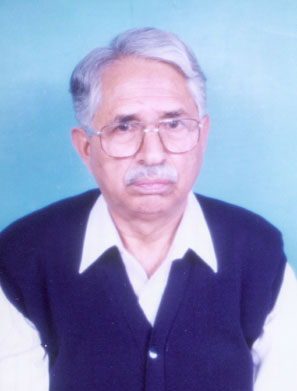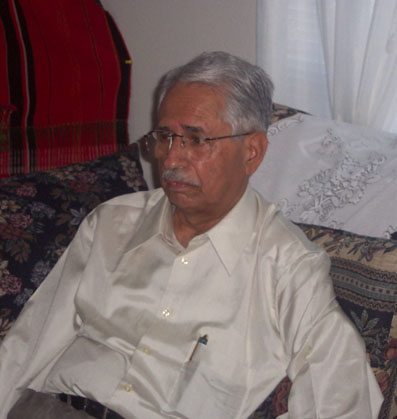|
 Harikrishna Kaul is one of
the major Kashmiri playwrights of the modern era. He started his literary career
during his college days in early fifties, writing short stories in Hindi. He
continued writing in Hindi till mid-sixties when he switched to writing in
Kashmiri and immediately established himself as a major Kashmiri playwright and
short story writer. Harikrishna Kaul is one of
the major Kashmiri playwrights of the modern era. He started his literary career
during his college days in early fifties, writing short stories in Hindi. He
continued writing in Hindi till mid-sixties when he switched to writing in
Kashmiri and immediately established himself as a major Kashmiri playwright and
short story writer.
Harikrishna Kaul's plays are about
ordinary people who provide us an opportunity to reflect on ordinary as well as
larger issues of life and existence. The characters are real flesh and blood
characters that one can easily relate to. The old man Lala Sahib of Yeli
Watan Khur Chu Yevan is perhaps the best example of such characters created
by Kaul. This widower and father of two middle aged sons painfully finds himself
becoming increasingly irrelevant in the affairs of the family. His futile search
for importance in the homes of his two sons ends up in his inability to decide
where to go. He has nowhere to go. This character lives in the memory of all
Kashmiris who heard the play on Radio or watched it on the television.
Another example of memorable characters
created by Harikrishna Kaul is the old accountant of the humurous play Dastar.
His uniquely archaic approach to office work became a legend and his famous
lines Rama Lagay Chaanya Lilaye could be heard on the streets of Srinagar
years after the play was first shown on television.
In mid seventies Kaul's play Natak
Kariv Band was first staged at Srinagar's Tagore Hall. This play draws on
the epic Ramayana and has Hanumana revolting against Rama's decision to banish
Sita. As the play unfolds the audience finds Rama representing the ruling
politicians who are ever ready to betray Sita, the people, for the sole aim of
staying in power and Hanumana unmasks this betrayal crying Natak Kariv Band.
This play is a milestone in Kashmiri literature and has been staged in Hindi as
well as other Indian languages. The chief minister of the state, Shiekh Abdullah
saw a performance in Delhi and was deeply moved. Tagore Hall. This play draws on
the epic Ramayana and has Hanumana revolting against Rama's decision to banish
Sita. As the play unfolds the audience finds Rama representing the ruling
politicians who are ever ready to betray Sita, the people, for the sole aim of
staying in power and Hanumana unmasks this betrayal crying Natak Kariv Band.
This play is a milestone in Kashmiri literature and has been staged in Hindi as
well as other Indian languages. The chief minister of the state, Shiekh Abdullah
saw a performance in Delhi and was deeply moved.
Harikrishna Kaul's characters like the
ones mentioned above are still popular in a Kashmir that is fast loosing its
touch with a secular past.
The exodus of the Kashmiri Pandits from
Kashmir valley in late eighties has robbed Kaul and indeed all other Kashmiri
Pandit playwrights the platform on which they presented their plays. There are
no audiences or listeners or viewers. So his literary contibution is now mostly
in the genre of short stories and novels. He has won many national awards for
his writings, including the Sahitya Academy Award, but has lost his
audience.
|
